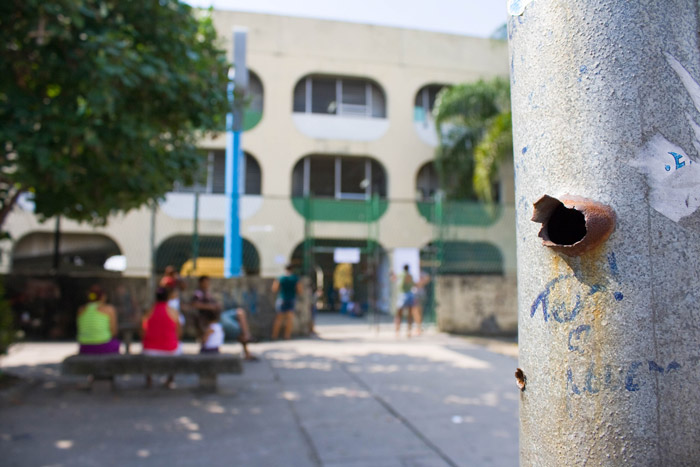For the original article by Artur Voltolini in Portuguese in Observatório de Favelas click here.
How the logic of war applied by the State in popular areas leaves the rights of children to learn and socialize on the back burner.

Though the right to an education is guaranteed by Brazil’s Constitution since 1988, by the Child and Adolescent Statute of 1990, and by the National Directives and Bases of Education Law of 1996, it is systematically violated by the state in Rio de Janeiro’s favela communities.
The Observatório de Favelas has obtained part of a report prepared by the state teachers’ union (SEPE) for the Lawyers’ Association (OAB) of Rio de Janeiro, detailing the state’s violations of educational rights in the Maré favelas in April and May of this year.
In one case, armed police officers scaled the wall of the CIEP (State-run public school) Operário Vicente Mariano during school hours to search the premises, terrifying students and staff, without presenting any authorization whatsoever and without identifying themselves, with the justification that all they required to enter the school without a warrant was one report of suspicious activity, and that in any case these children were used to weapons. The students and teachers had to stay lined up in the hall while the officers searched for the alleged weapons and drugs. Nothing was found. But the school remained closed for the following four days.
The report also tells of a student killed in front of CIEP Gustavo Capanema in 2011, and says that two people were killed in front of CIEP Presidente Samora Machel in April and May of this year. Police routinely enter the Maré favelas during school hours, park their armored vehicles at the door of a school and turn the surroundings into a battleground.
Susana Sá Gutierrez, art teacher at CIEP Elis Regina since 2000 and director of the state teachers’ union, says she felt the impact of such police actions with the “caveirão” (popular name for the armored vehicle used by the BOPE, the military police’s special operations unit) parked at the front door of the school when she was teaching a class on children’s literature, discussing scary stories about witches, vampires, and werewolves. “What struck me was that the students’ greatest fear was of the ‘caveirão,’” she says.
Susana goes on to say that the children’s fear gets in the way of their learning. They are agitated in the classroom, demonstrate difficulty concentrating, and can spend an entire class period talking about the violence they’ve experienced. “How can I teach about Miró to somebody whose father was shot by the police?” she asks. On the Thursday following the violent police operation that left ten people dead in Maré, she says her class was chaos. “Everyone was very upset. They insisted on spending the entire time talking about what had happened that morning–the beatings, the shots, knives in the throat.”
Susana thinks the city and state education secretaries should get the public safety secretary, Jose Mariano Beltrame, to find a solution. “School should be a place of education, not of repression,” she asserts.
Davi Marcos, 34, photographer and Maré resident, has transferred his son to a new school several times. “The children were frequently on lockdown inside CIEP Elis Regina when my son was there. They went 10 days with no classes because of police operations, and they never made up those days. A student’s father was killed on his way to pick up his child at school during a police raid, on the same route I usually took to pick up my child. If I hadn’t been running a little late, it could have been me. I had to pull my son out of that school because it wasn’t the least bit safe.”
One teacher who worked in Maré between 2010 and 2012, and who preferred not to be identified in this article, experienced several instances of violence during school hours. In the most serious case she was with a class of 30 students in the schoolyard when a police helicopter dipped dangerously close to the unprotected students, shooting at houses in the community. She attended several meetings of the local chapter of her school district (4a Coordenadoria Regional de Educação), where teachers were told that public safety was a matter for the state, not the city, and she also overheard people saying that these safety questions were just excuses for teachers to get out of work.
Mario Miranda Neto, president of the OAB-Rio de Janeiro Education Rights Commission, believes intelligent action would be more effective in combating crime in working-class communities. “We reject the sensationalism in the fight against crime; we reject the arms race. The state should not take over school grounds in the name of public safety. How symbolic that during the occupation of Alemão the army set up its headquarters inside a daycare.”
As Mario sees it, as long as we’re operating in a war mentality, no public building is off limits. In Alemão the army supposedly made an ex officio request to use the daycare. In police actions it is becoming normal for schools to be taken over, which intimidates principals and teachers. “A school should be as safe as a person’s home. The teachers are in charge of that space. We need to radicalize the republican and democratic processes on the school grounds,” he says.
Mario Miranda and Susana Sá Gutierrez both believe education is a fundamental right, one which should not be jeopardized in the effort to improve public safety. Education shouldn’t be held hostage by public safety any more than health, or transportation, or the rest of the state’s responsibilities.
